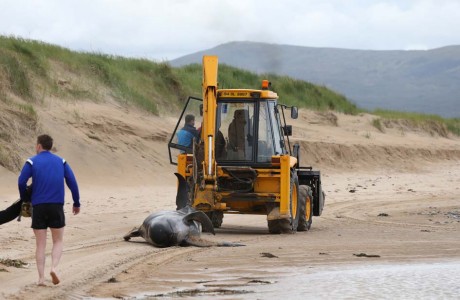
One of the dead whales is removed for burial.
BY SEAN HILLEN
MYSTERIOUS deaths of more than 50 whales off the northwest Donegal coast – including 13 in Falcarragh several weeks ago – has led to the re-surfacing of concerns about dangers to human health.
While it is not yet known exactly what caused the deaths, one of the reasons being considered is the dumping of toxic materials at sea.
Tissue samples from some beached whales have shown excess quantities of cancer-causing chemicals (carcinogens) such as manganese, benzene, coal-tar, radium, petrolatum, parabens, vinyl chloride lead and zinc.
“We can’t say for certain,” said Pat Vaughan, district conservation officer for the National Parks and Wildlife Service.
“What we do know is that whales and other marine animals often have high levels of certain toxic elements in their bodies.”
The 50 whale deaths in less than two years, a toll that does not include other cetaceans such as dolphins, included a sperm whale at Magheraroarty beach and 32 off Rutland Island in The Rosses.
Health officials say with recent technological developments, many of these chemicals are in the form of deadly nanoparticles (particles less than the size of a human or animal cell), which, airborne, can then penetrate human or animal body cells, causing untold damage.
Local environmentalist and wildlife enthusiast, Gareth Doherty, said “international regulations state that discharges of waste material – poisonous by nature – should not be made within a certain distance of any landmass, but who’s watching?”
He added that some major ports such as Edinburgh, Belfast and Dublin have ship-cleaning facilities “but this costs money so some incorrigible corporations say ‘why bother’?”
As the coast of Donegal is in direct line of most transAtlantic ocean traffic between Europe and the Americas, the amount of waste dumped offshore is probably immense, he added, saying “much of this waste is non-biogradable plastics that simply break up into smaller pieces and float over larger areas.”
According to global environmental group, Seas at Risk, these plastics have now formed what it terms ‘plastic islands’ – often the size of countries, one being larger than the US state of Texas, which in itself is 17 times larger than Ireland – that cause disruption to the normal flow of currents.
A special group has already been established at Ionad Naomh Pádraig in Dore by Freddie O’Donnell and Aodán Ó’Gallchoir to examine correlations between high levels of cancer in the Gaeltacht area and dumping of waste in the coastal waters nearby.
Known as ‘Scaoil Saor ó Ailse’ (Break Free from Cancer’), the group’s public relations officer, Joe Diver, said former local doctor Paddy Delap, said such waste was affecting peoples’ health.
An abnormally high level of fatalities from such cancers as skin, lung and brain have been reported.
A deep-sea diver broke his decades-old silence on Raidó na Gaeltachta, describing how he found a large area of the sea bed littered with large black drums with hazardous signage on them off Tory Island, adding, “We were looking for shipwrecks, went down 40 to 45 metres and came across black drums with green stuff growing on them. There were a few thousand of them.
They were heaped in a hill-like structure and had skull and crossbones on them.” The diver said the drums would have since disintegrated and their hazardous material dissolved into the ocean off the Gaeltacht.
Officials say areas affected could include Gaoth Dobhair, Cloughaneely and The Rosses. Several of the 13 whales at Ballyness beach, Falcarragh – the 13th such whale beaching this year alone – were found to have lesions, blemishes and lumps on their skin, but National Parks and Wildlife Service officials declined to say where any disease may have originated.
“Calls for greater funding for a more comprehensive analysis of the health dangers have so far being ignored by the relevant national authorities. “If he cares enough, new Gaeltacht junior minister, Joe McHugh should take up this issue and push for funding,” one local doctor said. www.seanhillenblog.com









